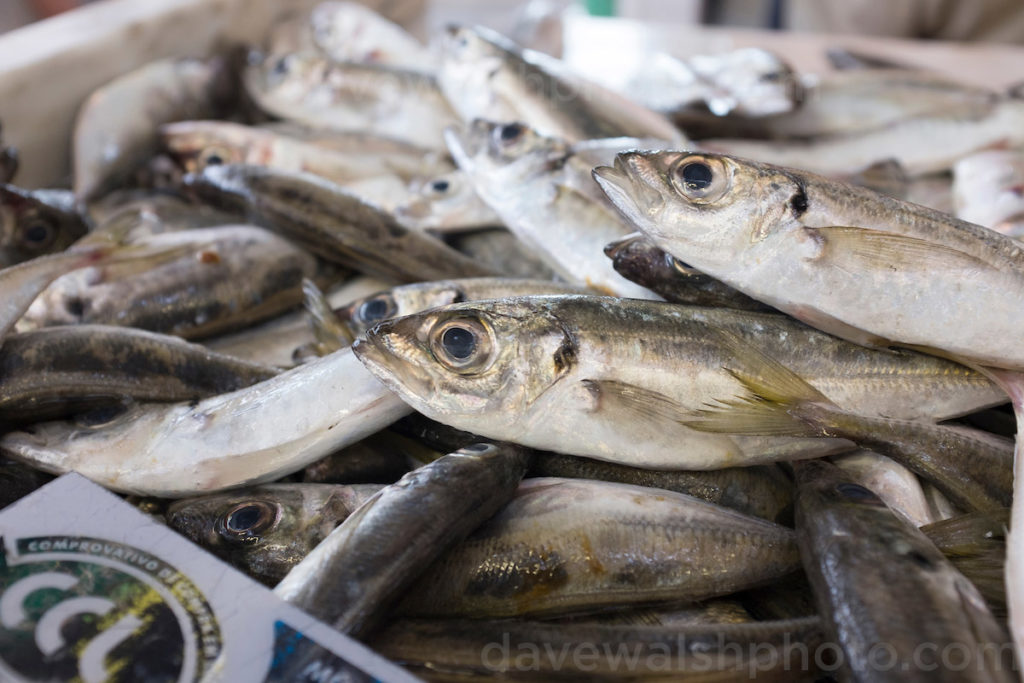
Sardines for sale – Vila do Bisbo, Algarve, Portugal. Photo: davewalshphoto.com
8 April 2019: – Following a workshop organized by the International Council for the Exploration of the Seas (ICES)in Lisbon to evaluate the recovery and management plan for Iberian sardine (Sardina pilchardus), 15 nongovernmental organizations (NGOs) from Portugal and Spain (1) are concerned about a plan submitted to the European Commission by the Portuguese and Spanish governments. This plan does not recognize the critical situation in which the stock is and does not provide the measures that can ensure its unquestionable recovery as has been certified by the researchers in the workshop.
The NGOs emphasize that the Iberian sardine stock, of great socioeconomic importance for several Portuguese and Spanish fleets, is, according to the scientific institutions that study it, in sharp decline for some decades ago and below the biological safety limits since 2009.After ICES issued an advice of zero-catch for the last two years (2), the two Member States submitted a recovery plan which had hitherto been considered by ICES to be insufficiently clear or complete for evaluation. At the time, this same plan was criticized by the Portuguese and Spanish NGOs due to the reduced relevance of control of catches for several years and the protection of juveniles.It is important to state that fish resources are public resources and, as such, should be managed for the common good, besides ensuring the viability of a sector. In addition, there is a need for the development of consistent and sustainable alternatives that will enable the industry to reduce its dependence and to not compromise its livelihoods when the biomass of one of its main target stocks is drastically reduced. Relying solely on a stock – and failing in its management – leads to its collapse, which in the medium to long term could lead to the collapse of the sector and the communities that depend on it.
The NGOs acknowledge all efforts already made by the sector, as well as all the work that has been done by researchers, within and outside the ICES working groups, to have a sound knowledge of the stock and to measures that would give the resource the best chance of recovery. They also point out that it is only by using scientific advice in establishing the fishing opportunities – as well as other management measures – that the main objective of the Common Fisheries Policy will be achieved: all European stocks at sustainable levels.
The NGOs acknowledge all efforts already made by the sector, as well as all the work that has been done by researchers, within and outside the ICES working groups, to have a sound knowledge of the stock and to measures that would give the resource the best chance of recovery. They also point out that it is only by using scientific advice in establishing the fishing opportunities – as well as other management measures – that the main objective of the Common Fisheries Policy will be achieved: all European stocks at sustainable levels.
Contacts
Eneko Aierbe (Ecologistas en Acción) | pesca@ecologistasenaccion.org | (+34) 665705002
Gonçalo Carvalho (Sciaena) | gcarvalho@sciaena.org | (+351) 936257281
Dave Walsh (Our Fish) | dave@our.fish | (+34) 691 826 764
Notes
1 Associação Natureza Portugal em associação com WWF, Associação Portuguesa para o Estudo e Conservação de Elasmobrânquios (APECE), Ecologistas en Acción, Fundació ENT, Grupo de Estudos de Ordenamento do Território eAmbiente (GEOTA), Greenpeace, Liga para a Protecção da Natureza, Oceana, Observatório Marítimo dos Açores(OMA), Our Fish, Quercus, Sciaena – Oceanos # Conservação # Sensibilização, Sociedad Española de Ornitología (SEO), Sociedade Portuguesa para o Estudo das Aves (SPEA) and World Wildlife Fund (WWF)
2 http://ices.dk/sites/pub/Publication%20Reports/Advice/2018/2018/pil.27.8c9a.pdf
